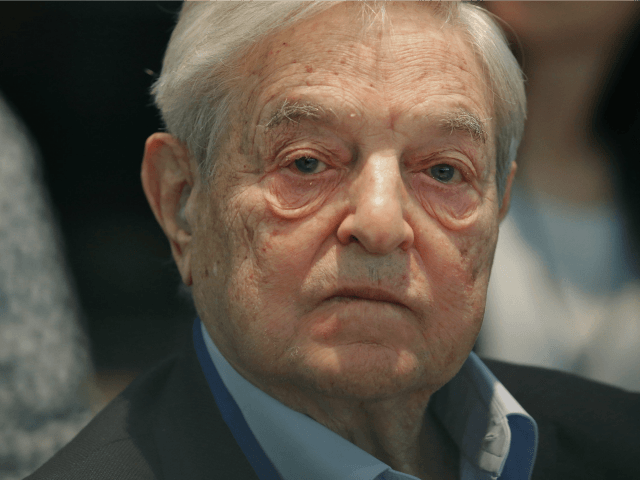Leaked Memo: Soros Foundation Eyed Stronger Internet Regulation in TPP Negotiations

Chip Somodevilla/Getty
A leaked document from George Soros’s Open Society Foundations reveals the organization was seeking to influence the positions of Latin American governments in negotiating the Transpacific Partnership Agreement, or TTP.
Soros’s organization does not appear to support the TPP outright, but expressed interest in influencing the sweeping internationalist treaty, including the treaty’s positions on Internet regulation.The document reveals the Foundations provided a grant to a Latin American group under the project title “Promotion of Human Rights Standards in Latin American Internet Regulation.” A description of the purpose of the grant, which was for $66,920, states a main goal was to impact TTP negotiations, especially related to Internet regulation in the draft international agreement.
The funds, approved April 2013, were awarded to ONG Derechos Digitales, a nonprofit based in Chile focused on public interest and technology.
In the “Objectives and Goals” section, the memo, referring to the TTP as the TTPA, states:
Advocate for the protection of human
rights standards in the Transpacific Partnership Agreement (TPPA):
provide technical assistance to negotiators of Latin American countries
(Chile, Peru, and Mexico) of the TPPA; raise awareness about the TPPA in
the Spanish-speaking countries.
The listed indicators that would prove the success of the grant
includes “protection of human rights standards in the TPPA; increased
capacity of civil society in Latin America to influence internet
regulation; a stronger network and better collaboration of civil society
working on digital rights in Latin America.”The information was contained in a document describing various grants titled, “Civil Liberties in the Digital Environment: Grant Recommendations for Core Grantees.”
The reference to influencing “human rights standards” in the TPP actually seems to relate to a globalist treaty that impacts domestic law. There too, the grant objectives referenced Internet regulation.
The Foundations memo makes clear it was seeking to “influence legislation” in Latin American countries to ensure “compliance with the Inter-American Convention on Human Rights.”
It relates:
Over the past few years, the governments
in Latin America have started to regulate the online environment, mainly
driven by the need to implement trade agreements. That said, this
“regulation trend” is set to further accelerate in the coming years as
the internet penetration rate is predicted to jump over 50%. This
presents a good opportunity for civil society to help set standards and
influence legislation in compliance with the Inter-American Convention
on Human Rights.
The Inter-American Convention on Human Rights seeks to impose a system
of universal human rights and rules, and it tasks governments with
altering their own domestic laws to align with those of the Convention,
including rules pertaining to property rights and the judicial system.
Twenty-three Central and South American countries are currently
members.In September 2013, Venezuela exited the pact, with President Hugo Chávez claiming the Commission was “campaigning against his government and acting at the behest of the United States.”
The preamble of the agreement states that the pact countries are “Reaffirming their intention to consolidate in this hemisphere, within the framework of democratic institutions, a system of personal liberty and social justice based on respect for the essential rights of man.”
The TPP, meanwhile, is an expansive trade agreement between 12 Pacific Rim countries, including the U.S. Obama has made the treaty a central part of his so-called pivot to Asia.
Earlier this week, White House spokesman Josh Earnest told reporters Obama would push for the TPP to be passed before he leaves office in January. Earnest said the president would make the case for the treaty during a speech in Laos on Sept. 6.
“The president is going to make a strong case that we have made progress and there is a path for us to get this done before the president leaves office,” Earnest said.
Soros himself has expressed tepid support for the TPP. Writing last year in the New York Review of Books, the billionaire called the TPP “an excellent opportunity for a two-pronged strategy” to forge a partnership with China if the treaty could be amended not to exclude China. Soros opposed Obama’s request to fast-track the TPP past Congress, instead advocating for the treaty to be altered to help forge a strategic partnership with China.
The Soros-funded Free Press organization has been a leading advocate for Internet regulation through “Net Neutrality.”
Aaron Klein is Breitbart’s Jerusalem bureau chief and senior investigative reporter. He is a New York Times bestselling author and hosts the popular weekend talk radio program, “Aaron Klein Investigative Radio.” Follow him on Twitter @AaronKleinShow. Follow him on Facebook.
With additional research by Brenda J. Elliott and Joshua Klein.
No comments:
Post a Comment